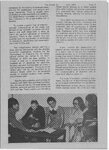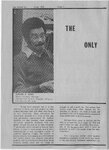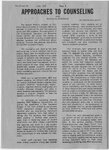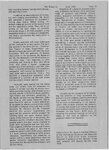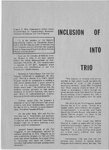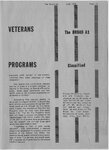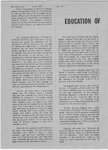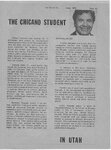| OCR Text |
Show The? Broad Ax THE CHICANO STUDENT School practives have evolved this to perpetuate local society by unconsciously encouraging the minority to fail academically, drop out early, and enter society at the low status traditional for Chicanos, thus producing the human type necessary to perpetuate local society. The Chicano’s failure to achieve well in school has contributed to the Anglo foregone conclusion that Chicanos are less intelligent, lazy, have less initiative. passive, fatalistic and Esqueda states that social service data reveals the following facts about Chicanos in Utah: (1) Chicanos make up 3.5 percent of. the state population; (2) 12.9 percent are on AFDC rolls; (3) 13 percent comprise the population at the Utah State Prison: (4) 10.68 percent are at the Detention Center: and (5) 19 percent are at the State Industrial School. He mentions that these figures reveal the overrepresentation of Chicanos in penal institutions and as wards of social service agencies. In contrast, there are no Chicano attorneys, physicians, elected public officials, Social Service top level administrators and in general, professional employees in the public _ Or private sectors. Moreover, Esqueda reveals, is the fact that traditional funding of public education based on antiquated formulas centered on assessed valuation of property and state equalization, provides unequal education for our children. He points out that traditionally parents of Chicano children have been greatly affected by unequal funding practices in local school districts. Their children attend schools where they Anglo higher have received children. Yet Chicano tax rate for school less funds than parents pay a purposed and receive less services. Teacher education institutions that train prospective teachers must include courses related to Chicano awareness, contribution of the Chicano minority community and more effective students teaching strategies for Chicano along with this factor, school districts must implement an effective affirmative action program that will provide more employment of minorities in order to have more positive role models. In addition to the above mentioned proposed revisions, Esqueda emphasizes that the counseling services for Chicanos must be upgraded in order to curtail the high dropout rate that exists in the state. Also, counseling is needed for students with a post-secondary education which includes trade skills as well as college preparatory programs. Another area of great need, according to Esqueda, is the development and dissemination of multi-ethnic materials. Textbooks do not reflect the contributions of Chicanos and hence the negative self-image is fostered among Chicano pupils and other minority groups. : Lastly, Esqueda argues, in terms of meaningful change for the benefit of Chicano pupils, is that of community control of programs for the poor. Strong advisory councils (PAC) for federal programs must be more concerned with the decision-making process as Opposed to advisory functions of the past. This mechanism can be developed as a very important tool tional opportunity at public school education. to assure equal educaleast in this sector of IN UTAH |




